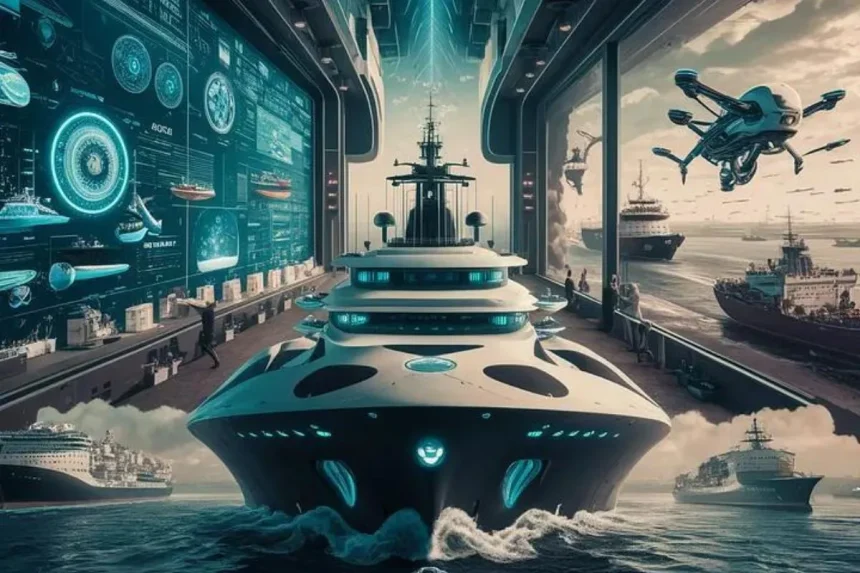The concept of a ship being its own captain, once a notion confined to science fiction, is steadily sailing into the waters of reality. Autonomous ships, equipped with advanced artificial intelligence (AI) and sophisticated navigation systems, are poised to revolutionize the maritime industry. But what does it mean for a ship to captain itself, and how feasible is this transformation?
The Dawn of Autonomous Ships
Autonomous ships can operate without human intervention, utilizing AI, machine learning, and a myriad of sensors and communication technologies. These ships are designed to navigate, make decisions, and perform tasks traditionally handled by human crews. The maritime industry, driven by the quest for efficiency, safety, and reduced operational costs, is increasingly investing in this technology.
Technological Backbone: AI and Machine Learning
At the heart of autonomous ships is AI, which processes vast amounts of data from various sensors, including radar, sonar, GPS, and cameras. Machine learning algorithms analyze this data to make real-time navigation, collision avoidance, and route optimization decisions. These systems are capable of learning from past experiences, and continuously improving their decision-making processes.
Advantages of Autonomous Ships
- Safety: Human error is a significant cause of maritime accidents. Autonomous ships can potentially reduce these incidents by making precise, data-driven decisions.
- Efficiency: Autonomous ships can optimize routes and speeds to conserve fuel, reducing operational costs and environmental impact.
- Operational Continuity: Unlike human crews, AI systems do not require rest, enabling continuous operation and potentially faster transit times.
Challenges on the Horizon
Despite the promising potential, several challenges must be addressed before autonomous ships can become mainstream.
- Technological Limitations: While AI has advanced significantly, it is not infallible. Adverse weather conditions, complex traffic situations, and unpredictable human behavior can still pose challenges.
- Regulatory and Legal Frameworks: The current maritime laws are designed with human-operated vessels in mind. New regulations must be developed to address the unique aspects of autonomous ships, including liability in the event of accidents.
- Cybersecurity: Autonomous ships rely heavily on digital systems, making them vulnerable to cyberattacks. Robust cybersecurity measures are essential to protect these vessels from malicious threats.
Real-World Examples and Progress
Several projects and prototypes highlight the progress in autonomous ship technology:
- Yara Birkeland: This Norwegian vessel, often cited as the world’s first fully electric and autonomous container ship, aims to reduce emissions and operating costs.
- Mayflower Autonomous Ship: An AI-powered ship that completed an unmanned transatlantic voyage, showcasing the potential for long-distance autonomous navigation.
The Human Element: A Changing Role
While autonomous ships may reduce the need for traditional crews, they will not eliminate the human element entirely. Shore-based operators will monitor and control fleets of autonomous vessels, intervening when necessary. Additionally, the development, maintenance, and management of these ships will create new roles and demand new skills within the maritime industry.
Conclusion: The Future is on the Horizon
The vision of a ship being its own captain is no longer a distant dream but an emerging reality. Autonomous ships hold the promise of safer, more efficient, and environmentally friendly maritime operations. However, realizing this potential requires overcoming technological, regulatory, and cybersecurity challenges. As the maritime industry navigates these waters, a hybrid approach — combining the strengths of AI with human oversight — seems to be the most prudent course.
The voyage towards fully autonomous ships is underway, charting a new course for the future of maritime transportation. While the seas ahead may be uncharted, the potential rewards make this journey an exciting and worthwhile endeavor.
Autonomous Ship Expo and Conference 2024: Navigating the Future of Maritime Automation
The Autonomous Ship Expo and Conference 2024 is set to take place at the RAI Amsterdam, Netherlands, on June 18–20, 2024. This event is dedicated to presenting the latest innovations and technologies that enable various levels of automation in the ship and cargo handling sectors, from anti-collision systems to fully autonomous operations.
As a truly global event, the Autonomous Ship Expo draws exhibitors and visitors from around the world. It offers a unique platform for showcasing cutting-edge autonomous navigation technology and onboard systems. Attendees will have the opportunity to explore advancements from sensor technology and e-navigation systems to automation software and remote-control technologies.
Leading companies in simulation, testing, and validation solutions will be present, alongside experts in cybersecurity and remote satellite communications. This comprehensive gathering will support ship designers, fleet owners, naval architects, classification societies, port authorities, shipyards, terminal managers, equipment manufacturers, and maritime research organizations in preparing for the advent of autonomous ships and the operational challenges they bring.
Join the Autonomous Ship Expo and Conference 2024 to navigate the future of maritime automation and stay at the forefront of this transformative industry.
Get More: https://www.timelinetale.com/


